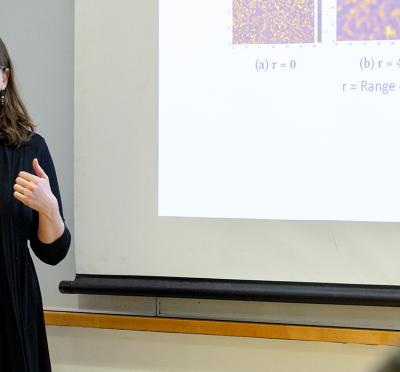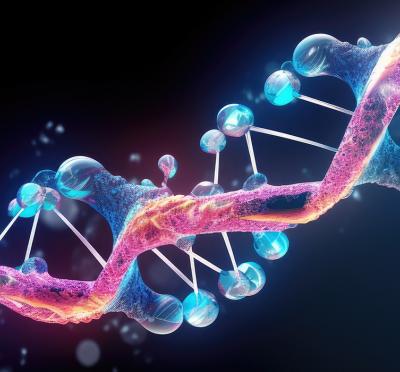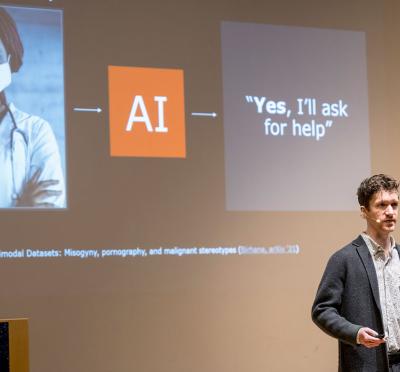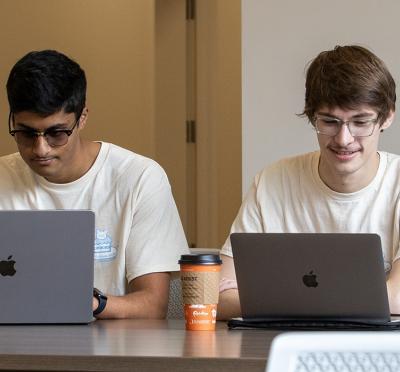
By Andrew Mobbs. Photos by Chance Saechao.
Once thinking he’d never study at a university, Daniel De León has been engaged in some deep learning for the past five years. Today he is a master’s student in computer science at Oregon State University and a GEM Fellow with a stack of internships under his belt.
“I graduated high school not focusing on any sort of schooling whatsoever,” De León said.
Still, in an attempt to find some direction post-high school, he enrolled at Cabrillo Community College near his home in Santa Cruz, California, and took what would become a crucial intermediate algebra class.
“The instructor for the first time treated me as an adult. I think that, along with how he taught the math, just changed something for me. It gave me a whole new perspective on math,” he said.
Working two jobs, De León took trigonometry and calculus classes with his instructor’s encouragement. Because his classmates were studying engineering, he decided to take introductory engineering and physics courses, which proved to be meaningful academically and personally.
“My parents are in a trio. They play Mexican music. I was always very subjectively into music and audio,” De León explained. “So, when it came to physics, we learned about audio objectively. The science behind audio and the acoustics blew my mind!”
De León stayed on at Cabrillo to take more engineering and programming classes and assist a circuits class taught by Carlos Figueroa, his first physics instructor, who encouraged him to keep learning.
“He was a big inspiration in my life, seeing that he was a Chicano Mexican-American in STEM,” De León said.
In 2017, De León was accepted as an undergraduate engineering student at Cal Poly. He then obtained a Research Experience for Undergraduates internship with the Monterey Bay Aquarium Research Institute, applying his programming skills to analyze the acoustics of whale sounds. This inspired him to pursue computer engineering.
“That opportunity was really impactful in my life, classifying blue whale and fin whale calls using machine learning. I had never seen machine learning. I basically got to open my eyes to what machine learning, deep learning was,” he said.
De León then joined the Society for Advancement of Chicanos/Hispanics and Native Americans in Science. He presented a poster on his whale acoustics research at the national SACNAS conference in Salt Lake City, gaining the attention of a Google journalist who noticed he had used TensorFlow software for the deep learning aspects of his project. Consequently, he was profiled in a five-minute documentary from Google’s “Search On” series.
“That experience really showed that, regardless of your background, you can follow your curiosities,” De León said.
De León’s curiosities led him to three internships with Intel Corp. from 2018 to 2020 — first, working with field programmable gate array circuits in Chandler, Arizona; next, testing engineering product prototypes in Hillsboro; and finally, working virtually on artificial intelligence applications with the company’s San Jose, California, campus. Intel was also important in another way.
“Intel was the real reason why grad school became a possibility,” De León said.
Intel is De León’s corporate sponsor for his GEM Fellowship, through which a business and a university help fund graduate studies. Cue Oregon State’s David Mellinger, associate professor and senior researcher at the Hatfield Marine Science Center in Newport, who had also worked at MBARI before De León. Mellinger, who applies machine learning and deep learning to underwater audio recordings, is one of De León’s two faculty mentors. The other is Patrick Donnelly, assistant professor of computer science at OSU-Cascades and supervisor of the Soundbendor Lab, who applies deep learning to sound and music. Donnelly is also interested in bioacoustics, and all three collaborate on research.
“My project kind of combines these two forces of computer science with the application in bioacoustics,” De León said.
Capping off his first year of graduate school, De León completed a research and development internship with Lam Research to explore the possibilities of deep learning models in the production of silicon wafers. Additionally, he is the grad chair for the Oregon State SACNAS chapter, recruiting graduate students to the organization and mentoring undergraduates, especially from underrepresented groups, on what graduate school is, how to apply, and tips to be successful. He also taught coding to Latino high school students in Mariachi STEAM’s #CovidCorridos workshop in the summer of 2020.
With all his experience, De León, who expects to graduate in 2022, will have numerous options. Initially, he plans to go into industry, but he hasn’t ruled out obtaining a doctorate. He’s sure about one thing, though:
“I don’t ever want to stop learning.”



